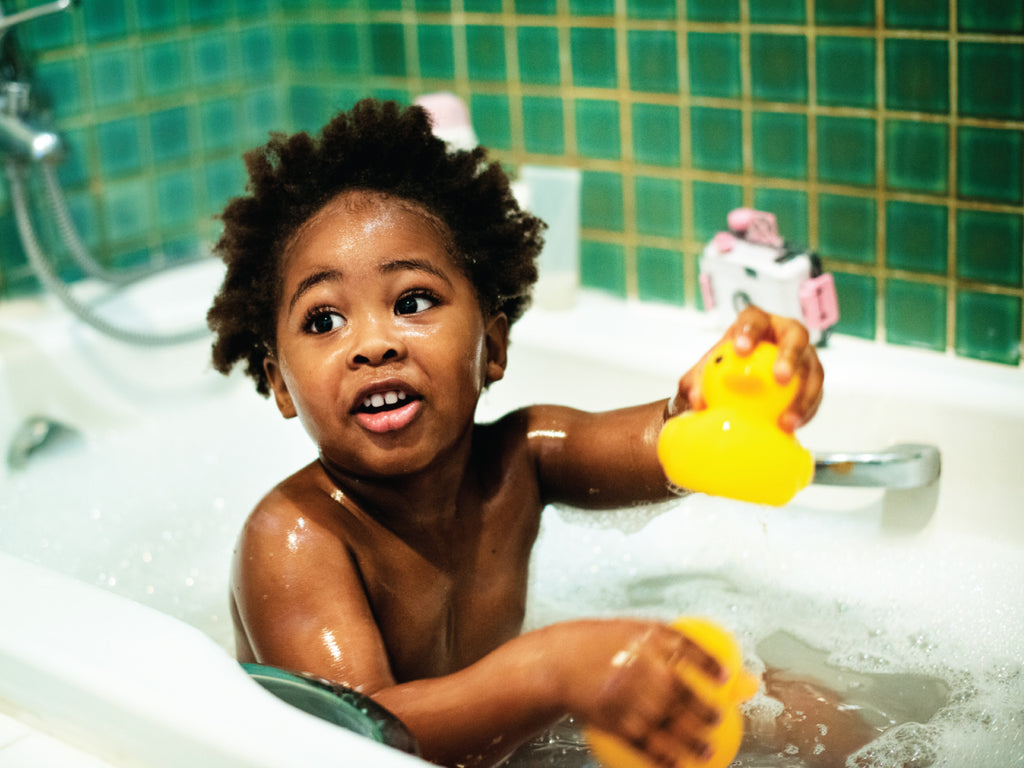
Bubble baths marketed for kids with sensitive skin are all the rage at the moment - but are they all they’ve been cracked up to be?!
The problem with bubble baths and body washes is that the ingredient that makes them foam (a surfactant) is the same thing that can damage the skin's top layer, leaving it open to irritation, damage and dehydration.
How can bubbles be bad for skin?!
Surfactants work by lowering surface tension, binding to oil and dirt so it can be washed off, which is exactly what you want for nice clean skin! But unfortunately surfactants also bind to the natural oils that the skin needs to make a protective barrier, stripping them from the skin and causing damage. So even bubble baths advertised as good for sensitive skin will contain ingredients that can cause problems.
One of the most difficult issues with bubble bath as opposed to, say, body wash or shampoo, is that it is not a ‘wash off’ product. It is made to sit in, for quite a long time, depending on how happy your little one is to be in there! So the irritant potential is pretty high, even for kids without eczema.
What are the problematic ingredients to look out for - and avoid! - in bubble baths?
- Cocamidopropyl betaine - associated with irritation and contact dermatitis
- Parfum or fragrance - most people with eczema can't tolerate synthetic fragrances
- Benzyl alcohol - very drying and can cause stinging at higher concentrations
- Sodium lauryl sulfate (aka SLS) or sodium laureth sulfate (SLES) - can be very irritating
- Parabens - commonly listed as things like butylparaben, methylparaben or propylparaben etc., parabens are synthetic preservatives that have been associated with skin irritation, dermatitis and dryness.
- Methylisothiazolinone / Methylchloroisothiazolinone - preservatives found in cosmetics linked to neuro-toxicity and allergic reactions, including eczema flare-ups.
- Phenoxyethanol - preservative known to have caused severe allergic reactions and eczema.
- Phthalates - now banned in the EU but still commonly used in products in the US, phthalates are linked to endocrine disruption, developmental and reproductive toxicity, and cancer.
- PEGs - stands for polyethylene glycol, and refers to a mixture of compounds that are used as emulsifiers and for their skin-penetrating properties; they’re best avoided on broken or eczema-prone skin because they can cause skin damage, irritation and sensitivity.
- Glycolic acid, salicylic acid, and retinol - these products tend to dry out or irritate skin which can make eczema patches worse or cause a new flare-up
What can you use instead?
Much as we hate to say it, no bubbles at all are the safest for delicate baby skin. There’s good evidence to suggest that any kind of detergent can cause problems for a baby’s skin barrier, and that there’s no reason to use soap, body wash or shampoo at all on babies younger than a year.
Check out our blog on How To Bathe a Baby With Eczema for more detailed information, but our top tip would be to keep baths short, warm and free from bubbles or soap. If you want to add anything you can just use a little of our Bath & Body Oil or put in a sock full of porridge oats for a lovely soft milky bath!
